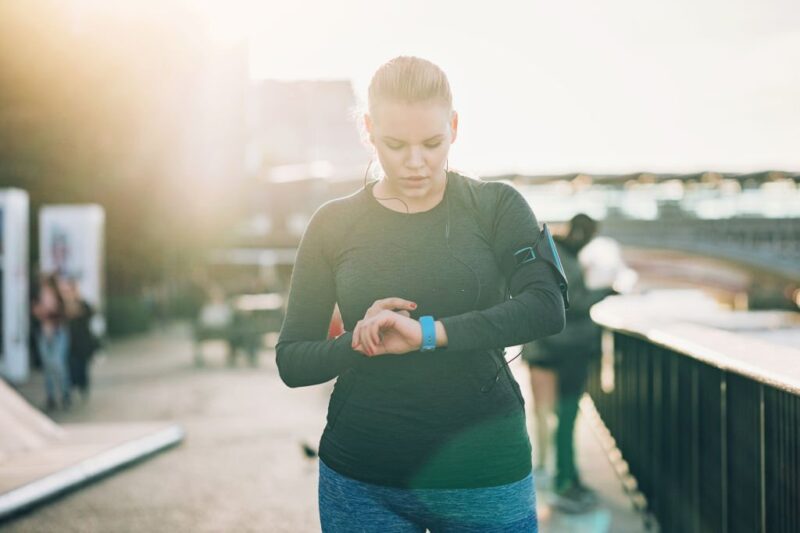- Research conducted with mice and humans has demonstrated the value of restricting food consumption to periods of activity – when an individual is at their most aware and active – as an effective strategy to lose weight and manage blood sugar more effectively.
- Recent mouse research has unsurprisingly demonstrated that restricting feeding time during rest periods significantly enhanced endurance tests in running.
- This finding was astonishing and unexpected given that eating during restful times is generally considered unhealthy for well-being.
- Although these results are promising, more research must be completed to understand how they impact human physiology and athletic performance fully.
Most organisms, from bacteria to humans, possess psychological, mental, and physical rhythms known as circadian rhythms based on a 24-hour clock.
Biological clocks drive circadian rhythms. Trusted Source comprised of specific genes and proteins expressed throughout all types of cells, including muscle cells of skeletal muscles.
These biological clocks are controlled by an internal master clock within our brains known as the “suprachiasmatic nucleus (SCN).” Trusted Source.
Your body has internal circadian rhythms that are unique to it; however, these cycles can be disrupted by outside sources and stimulated through lights in its surrounding environment. A “master timer,” the SCN, controls these cycles through rays emitted by this master clock.
Researchers have recently identified that eating timing immensely influences biological clocks that exist throughout the body, including in the liver.
Studies were undertaken regarding the effect of restricted feeding (in animals) and time-restricted consumption (in humans), in which daily food intake is limited to six-12 hours.
Time-restricted diets: Evidence and Implications
Studies using mice have demonstrated the benefits of time-restricted dieting on metabolic illnesses such as weight gain, liver failure, blood sugar build-up, abnormal levels of fats in the blood, and decline with age in heart functioning.
Reducing feeding time without altering caloric intake was demonstrated to stop or lessen their impact, including weight gain and liver dysfunction, blood sugar build-up, abnormal fats in the blood, and functional decline due to age in various metabolic illnesses, including weight gain-related conditions, including weight gain as well as liver issues related to these health problems such as weight gain caused by time restriction alone.
Studies of humans by Trusted Source indicate that time-restricted eating (a type of intermittent fasting) — whether with caloric reduction or otherwise — was found to help with weight loss by improving blood sugar control, lowering blood pressure, and raising lipid levels.
New human evidence shows that restricting diet during Ramadan or fasting can increase endurance. Unfortunately, how the timing of meals impacts daily muscle rhythms remains unknown – this may also affect fitness performance negatively.
Dr. Min-Dian Li, an academic of internal medicine and cell biology as well as Director of Army Medical University’s Centre of Excellence for Circadian Metabolism and Cardiovascular Disease, conducted a daylong eating study for mice to gain more insight into how performance during exercise depends upon when they eat.
These findings were published in Nature Metabolism Trusted Source.
Eating on Rest Periods Increases Endurance
Consuming food during rest periods will increase endurance in mice, as these creatures are generally nocturnal and sleep during the day. Feeding during the daytime would be equivalent to human behavior of eating during rest time and at nighttime, respectively.
Dr. Li’s group discovered that when mice were fed during their period of rest for three weeks, their time running and distance increased twofold when compared with mice fed freely or during active periods (without night/wake restrictions on when to consume food intake)—this pattern held in both male and female mice.
Dr. Li’s results for his team were nothing short of “absolutely amazing and shocking.” Since restricting feeding to daytime hours for mice can harm metabolic health, Dr. Li expected the treadmill test would last only for a limited time.
But even at night, mice did not exhibit any signs of fatigue when running; after repeated trials with different groups related to gender and time of day restrictions (daytime restricted feeding) as well as the level of training, results of daytime restricted feeding remained solid and reliable, the researcher observed.
Dr. Juleen R. Zierath, Professor of Physiology at Karolinska Institutet in Sweden, who wasn’t part of this research project, commented on its results as being somewhat unexpected and bizarre: The majority of evidence today suggests eating during rest periods should not be done to ensure optimal health; yet here we see evidence suggesting eating increased exercise effectiveness!
What factors contribute to night eating’s ability to help increase endurance?
The research found that increased endurance among runners directly correlated to changes to their gastrocnemius muscle, the primary muscle in their calves.
Diets restricted to daytime eating increased the proportion of fast-twitch type 2A oxidative muscles while decreasing type 2X fibers.
Researchers found it fascinating that when they removed Bmal1, which plays a central role in controlling circadian rhythms within mice muscle tissue, any increased capacity for daytime-restricted feeding vanished utterly.
Researchers discovered an essential gene known as Plin5, which plays an integral part in lipid metabolism and is controlled through Bmal1 within muscle tissue.
Studies conducted on mice found that decreasing levels of Plin5 protein had the same beneficial impact as restricting daytime eating to increase running performance.
Dr. Li and colleagues propose that Bmal1 acts like a switch that allows muscles to shut off the production of Plin5 when eating on a restricted diet during the daytime.
Researchers also noted that restricting feeding on certain days of the week was associated with higher blood and muscle levels of certain chemicals known as acylcarnitines, which enable muscles to utilize fat more efficiently for energy generation.
Eating Late can Cause Metabolic Dysfuntion
Dr. Lawrence W. Judge of Ball State University School of Kinesiology’s Master Coaching Program did not take part in this research but acknowledged its significance by telling MNT it would not be wise for endurance athletes to adopt restricted-feeding daytime programs based on this evidence; results come from studies on mice which may or may not reflect how these findings apply to human physiology or sports performance.
Further studies involving human subjects are necessary to accurately assess the benefits and dangers of restricting diet during the day in endurance athletes. It is recommended to seek expert guidance regarding nutrition, exercise science, and sports medicine before making specific diet recommendations for athletes.”
Dr. Lawrence Judge
Dr. Zierath concurs with this opinion and feels human research must occur.
“Athletes require sufficient fuel in their bodies to undertake endurance training”; however, “evening eating may not pose an issue for athletes; however, for those who sit, it could be problematic over time and cause metabolic issues,” cautioned she.
Researchers conducting the study reported a dramatic increase in endurance when mice consumed food only during rest periods.
Dr. Zierath believed that similar behavior observed among humans would likely interfere with sleep and have an adverse impact on performance, potentially hindering performance negatively and leading to detrimental health consequences.
What are the Limits of This Study?
When asked about its limitations, Dr. Zierath alluded to how mice in this study did not reflect the human diet accurately.
“Further research should be conducted on humans to understand which foods and their timing help improve endurance,” she noted.
Dr. Zierath explained that, during their study, mice underwent exercise performance tests two hours post-sleep.
“Human beings typically aren’t capable of engaging in high-performance training for 2 hours after falling asleep, according to Dr. Zierath’s research.” As such, further studies should evaluate fitness performance over an appropriate period.






